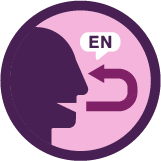Welcome
Introduction to Requests and Reflexive Pronouns
Adding information
Role play: Bumping into an old friend
I've never heard of them
You're always working!
Relative clauses
Cause and effect
Quiz: Adding information
Adverbs
This is surpisingly cheap!
Adverb positions
Either and neither
Practice your speaking with me!
Quiz: Adverbs
Requests
Role play: What would you do if you were me?
Requests with "will" and "would"
Is it necessary?
Asking for advice
Quiz: Requests
Useful phrases
Reflexive and reciprocal pronouns
I hope so / not
A week's holiday
Placeholders: do, does and did
Quiz: Useful phrases
Phrasal verbs
We're not dressing up, are we?
They ran out of patience
Interactive Activity: Vocabulary and Grammar
Quiz: Phrasal verbs
Till the next time!
Congratulations!
Você não tem acesso a esta aula
Continue aprendendo! Junte-se e comece a impulsionar sua carreira
Se você já tem uma conta,
Reflexive and reciprocal pronouns
15/22Los pronombres reflexivos (reflexive pronouns) son utilizados cuando el objeto es el mismo que el sujeto del verbo.
| Personal pronoun | Reflexive pronoun |
|---|---|
| I | myself |
| you | yourself |
| he | himself |
| she | herself |
| it | itself |
| we | ourselves |
| you (plural) | yourselves |
| they | themselves |
Verbos comunes para utilizar pronombres reflexivos
Existen algunos verbos que por su significado tienden a referirse al mismo sujeto, los más comunes son:
| amuse | blame |
|---|---|
| cut | dry |
| enjoy | help |
| hurt | introduce |
| kill | prepare |
| satisfy | teach |
Ejemplos utilizando pronombres reflexivos
❌ I help me.
✅ I help myself.
❌ Be careful with that knife, you might hurt you.
✅ Be careful with that knife, you might hurt yourself.
❌ Would they like to pour them a drink?
✅ Would they like to pour themselves a drink?
¿Cuándo no utilizar pronombres reflexivos?
No se utilizan los pronombres reflexivos después de verbos que describan acciones que la gente usualmente realiza para sí mismos. Por ejemplo, vestirse, es una acción que en la mayoría de los casos se lo puede hacer uno mismo.
- He always shaved before going to bed.
- Kim got dressed and got ready for the party.
Sin embargo, se puede utilizar los pronombres reflexivos, si se quiere realizar un énfasis sobre la acción.
- She dressed herself, even though she’s only three.
- He is old enough to shave himself.
Pronombres recíprocos
Los pronombres recíprocos (reciprocal pronouns) se utilizan para expresar una acción mutua entre dos o más personas u cosas. Los pronombres recíprocos son: each other y one another. Ambos pronombres se emplean indistintamente.
Sentence 1: Mark helped John.
Sentence 2: John helped Mark.
Complete sentence: Mark and John helped each other.
Diferencia entre pronombres reflexivos y recíprocos
No confundir con los pronombres reflexivos, la oración tiene un significado diferente dependiendo del tipo de pronombre que se utilice.
We sent one another a gift. (se dieron un regalo mutuamente)
We sent ourselves a gift. (cada uno se dió un regalo a sí mismo)
Ana and Cesar talk to each other regularly. (mutuamente)
Ana and Cesar talk to themselves regularly. (a sí mismos)
Ejercicio de writing
Escribe una oración para las siguientes condiciones:
- Refer to the subject
- Emphasize
- Reciprocal pronouns
¡Comparte tu trabajo en la sección de aportes!
Contribución creada por Andrés Guano (Platzi Contributor).
Contribuições 0
Perguntas 0

Quer ver mais contribuições, perguntas e respostas da comunidade?